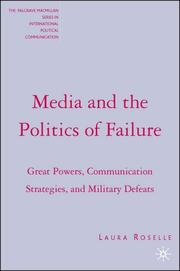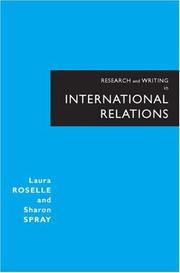| Listing 1 - 7 of 7 |
Sort by
|

ISBN: 1403975256 Year: 2006 Publisher: New York (N.Y.) : Palgrave Macmillan,
Abstract | Keywords | Export | Availability | Bookmark
 Loading...
Loading...Choose an application
- Reference Manager
- EndNote
- RefWorks (Direct export to RefWorks)
Great powers are not supposed to lose wars, so how do leaders explain military defeat when it happens? 'Media and the Politics of Failure' analyzes the American experience in Vietnam and the Soviet experience in Afghanistan to draw larger conclusions about how and why political leaders explain the end of military involvement. In spite of differences in political and media systems, there are remarkable similarities between American and Soviet leaders' communication strategies. Great power identity and domestic politics shape an explanation of withdrawal that emphasizes success and invokes prestige. The factors that shape the construction of the story did not disappear with the end of the Cold War, thus this work offers important insights for current American and Russian military efforts.
Communication in politics --- Mass media --- Vietnam War, 1961-1975 --- War in mass media. --- Mass media and the war. --- Afghanistan --- History

ISBN: 9780321277664 032127766X Year: 2008 Publisher: New York Pearson Education, Limited
Abstract | Keywords | Export | Availability | Bookmark
 Loading...
Loading...Choose an application
- Reference Manager
- EndNote
- RefWorks (Direct export to RefWorks)
#SBIB:32H3 --- #SBIB:303H13 --- #SBIB:327H03 --- Politieke wetenschappen: inleidende werken, handboeken, methoden --- Methoden en technieken: politieke wetenschappen --- Internationale betrekkingen: onderwijs en onderzoek --- International relations --- Coexistence --- Foreign affairs --- Foreign policy --- Foreign relations --- Global governance --- Interdependence of nations --- International affairs --- Peaceful coexistence --- World order --- National security --- Sovereignty --- World politics --- Research --- Internationale betrekkingen. --- Onderzoeksmethoden. --- Rapporteren.
Periodical
Abstract | Keywords | Export | Availability | Bookmark
 Loading...
Loading...Choose an application
- Reference Manager
- EndNote
- RefWorks (Direct export to RefWorks)
Book
ISBN: 9780415721882 9780415717601 0415717604 0415721881 9781315871264 9781317975182 9781317975199 Year: 2013 Publisher: New York : Routledge,
Abstract | Keywords | Export | Availability | Bookmark
 Loading...
Loading...Choose an application
- Reference Manager
- EndNote
- RefWorks (Direct export to RefWorks)
"Communication is central to how we understand international affairs. Political leaders, diplomats, and citizens recognize that communication shapes global politics. This has only been amplified in a new media environment characterized by Internet access to information, social media, and the transformation of who can communicate and how. Soft power, public diplomacy 2.0, network power - scholars and policymakers are concerned with understanding what is happening. This book is the first to develop a systematic framework to understand how political actors seek to shape order through narrative projection in this new environment. To explain the changing world order - the rise of the BRICS, the dilemmas of climate change, poverty and terrorism, the intractability of conflict - the authors explore how actors form and project narratives and how third parties interpret and interact with these narratives. The concept of strategic narrative draws together the most salient of international relations concepts, including the links between power and ideas; international and domestic; and state and non-state actors. The book is anchored around four themes: order, actors, uncertainty, and contestation. Through these, Strategic Narratives shows both the possibilities and the limits of communication and power, and makes an important contribution to theorizing and studying empirically contemporary international relations"--
Communication en politique --- Communication dans les relations internationales --- Communication in politics. --- Mass media. --- Social media. --- International relations. --- Social policy. --- #SBIB:327.1H20 --- #SBIB:309H507 --- National planning --- State planning --- Economic policy --- Family policy --- Social history --- Coexistence --- Foreign affairs --- Foreign policy --- Foreign relations --- Global governance --- Interdependence of nations --- International affairs --- Peaceful coexistence --- World order --- National security --- Sovereignty --- World politics --- User-generated media --- Communication --- User-generated content --- Mass communication --- Media, Mass --- Media, The --- Political communication --- Political science --- Sociologie van de internationale betrekkingen: algemeen --- Code en boodschap: narrativiteitstheorie --- POLITICAL SCIENCE / International Relations / General. --- POLITICAL SCIENCE / Public Policy / General. --- Political science / international relations / general. --- Political science / public policy / general. --- Communication in politics --- Mass media --- Social media --- International relations --- Social policy --- Communication en politique. --- Communication dans les relations internationales.
Book
ISBN: 9780472130214 0472130218 Year: 2017 Publisher: Ann Arbor : University of Michigan Press,
Abstract | Keywords | Export | Availability | Bookmark
 Loading...
Loading...Choose an application
- Reference Manager
- EndNote
- RefWorks (Direct export to RefWorks)
This book brings together leading scholars in International Relations (IR) and Communication Studies to investigate how, when, and why strategic narratives shape the structure, politics, and policies of the global system. Put simply, strategic narratives are tools that political actors employ to promote their interests, values, and aspirations for the international order by managing expectations and altering the discursive environment. These narratives define 'who we are' and 'what kind of world order we want'.
International relations. --- Communication in politics. --- Persuasion (Psychology) --- #SBIB:327.1H20 --- Communication --- Conformity --- Influence (Psychology) --- Propaganda --- Psychology, Applied --- Political communication --- Political science --- Coexistence --- Foreign affairs --- Foreign policy --- Foreign relations --- Global governance --- Interdependence of nations --- International affairs --- Peaceful coexistence --- World order --- National security --- Sovereignty --- World politics --- Sociologie van de internationale betrekkingen: algemeen --- INTERNATIONAL RELATIONS --- COMMUNICATION IN POLITICS --- PERSUASION (PSYCHOLOGY) --- International relations --- Communication in politics
Book
ISBN: 9781501360312 9781501360299 Year: 2020 Publisher: New York : Bloomsbury Academic,
Abstract | Keywords | Export | Availability | Bookmark
 Loading...
Loading...Choose an application
- Reference Manager
- EndNote
- RefWorks (Direct export to RefWorks)
Spaces of War, War of Spaces provides a rich, international and multi-disciplinary engagement with the convergence of war and media through the conceptual lens of 'space'. 'Space' offers a profound, challenging and original framework through which notions of communication, embodiment, enactment, memory and power are interrogated not only in terms of how media spaces (traditional, digital, cultural, aesthetic, embodied, mnemonic) transform the conduct, outcomes and consequences of war for all involved, but how 'war' actors (political, military, survivors, victims) recreate space in a manner that is transformative across political, social, cultural and personal spheres. Foregrounding the work of artists, activists and practitioners alongside more traditional scholarly approaches Spaces of War, War of Spaces engages with the 'messiness' of war and media through the convergence of practice and theory, where showing and embodying is made explicit.
Mass media and war --- Space and time in mass media --- Médias et guerre --- Espace et temps --- Médias et guerre
Book
ISBN: 0472122509 Year: 2017 Publisher: Ann Arbor : University of Michigan Press,
Abstract | Keywords | Export | Availability | Bookmark
 Loading...
Loading...Choose an application
- Reference Manager
- EndNote
- RefWorks (Direct export to RefWorks)
"'Forging the World' brings together leading scholars in International Relations (IR) and Communication Studies to investigate how, when, and why strategic narratives shape the structure, politics, and policies of the global system. Put simply, strategic narratives are tools that political actors employ to promote their interests, values, and aspirations for the international order by managing expectations and altering the discursive environment. These narratives define 'who we are' and 'what kind of world order we want."
International relations. --- Communication in politics. --- Persuasion (Psychology)
| Listing 1 - 7 of 7 |
Sort by
|

 Search
Search Feedback
Feedback About UniCat
About UniCat  Help
Help News
News